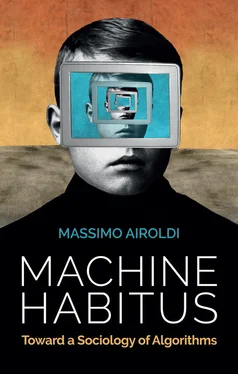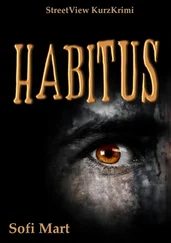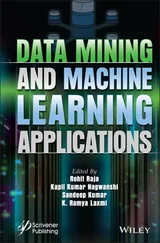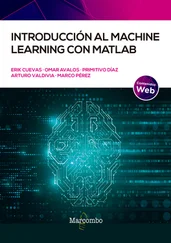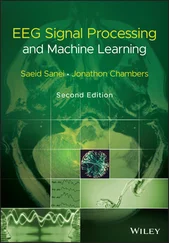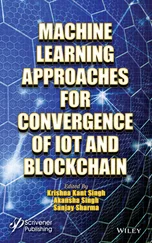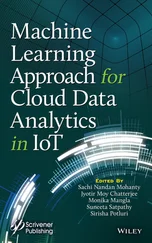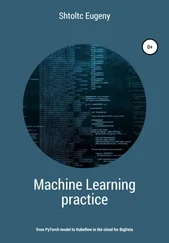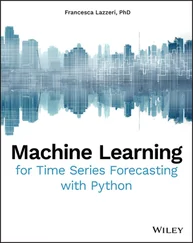117 108
118 109
119 110
120 111
121 112
122 113
123 114
124 115
125 116
126 117
127 118
128 119
129 120
130 121
131 122
132 123
133 124
134 125
135 126
136 127
137 128
138 129
139 130
140 131
141 132
142 133
143 134
144 135
145 136
146 137
147 138
148 139
149 140
150 141
151 142
152 143
153 144
154 145
155 146
156 147
157 148
158 149
159 150
160 151
161 152
162 153
163 154
164 155
165 156
166 157
167 158
168 159
169 160
170 161
171 162
172 163
173 164
174 165
175 166
176 167
177 168
178 169
179 170
180 171
181 172
182 173
183 174
184 175
185 176
186 177
187 178
188 179
189 180
190 181
191 182
192 183
193 184
194 185
195 186
196 187
197 188
198 189
199 190
200 191
201 192
202 193
Machine Habitus
Toward a Sociology of Algorithms
Massimo Airoldi
polity
Copyright © Massimo Airoldi 2022
The right of Massimo Airoldi to be identified as Author of this Work has been asserted in accordance with the UK Copyright, Designs and Patents Act 1988.
First published in 2022 by Polity Press
Polity Press
65 Bridge Street
Cambridge CB2 1UR, UK
Polity Press
101 Station Landing
Suite 300
Medford, MA 02155, USA
All rights reserved. Except for the quotation of short passages for the purpose of criticism and review, no part of this publication may be reproduced, stored in a retrieval system or transmitted, in any form or by any means, electronic, mechanical, photocopying, recording or otherwise, without the prior permission of the publisher.
ISBN-13: 978-1-5095-4327-4
ISBN-13: 978-1-5095-4328-1 (pb)
A catalogue record for this book is available from the British Library.
Library of Congress Control Number: 2021939495
The publisher has used its best endeavours to ensure that the URLs for external websites referred to in this book are correct and active at the time of going to press. However, the publisher has no responsibility for the websites and can make no guarantee that a site will remain live or that the content is or will remain appropriate.
Every effort has been made to trace all copyright holders, but if any have been overlooked the publisher will be pleased to include any necessary credits in any subsequent reprint or edition.
For further information on Polity, visit our website: politybooks.com
Habitus, c’est un grand mot pour dire quelque chose, je crois, de très complexe. C’est à dire, une espèce de petite machine génératrice – pour une analogie un peu sauvage, un programme d’ordinateur – à partir duquel les gens engendrent des foules des réponses à des foules des situations.
Pierre Bourdieu
Interview with Antoine Spire, 1990
If social order is made of propensities to associate, if to be social is a propensity to associate, then big data conversion events operationalize association in matrices of propensity.
Adrian Mackenzie, 2018
I would like to thank Salvatore Iaconesi and Oriana Persico for taking part in two interview sessions, in the autumn of 2019 and the summer of 2020, and being a unique source of inspiration. I must also thank Hanan Salam, founder of Women in AI, for her technical clarifications and preliminary comments on this book project, and Debora Pizzimenti, for providing me with further details about the IAQOS experience. A big thanks to Alessandro Gandini, Mauro Barisione, Adam Arvidsson, and Polity’s editors and anonymous reviewers, for their insightful comments and encouragement all the way through. I also thank all my colleagues and students at EM Lyon. Last, a huge thanks to Stefania, my most important person.
Figures and Tables
Figures
1 1 Algorithms: a conceptual map, from Euclid to AlphaGo
2 2 Networks of associated words learned by IAQOS
3 3 An example of a phishing email targeting my professional email address, not automatically marked as ‘spam’
4 4 On the left-hand side, related music videos network (directed); on the right-hand side, commenter videos network (undirected).
5 5 Techno-social effects on field boundaries
1 1 Machine socialization processes in different types of algorithms
2 2 Types of user–machine interaction (effects on users in brackets)
3 3 Research directions for the sociology of algorithms, with selected example studies
On 31 March 2019, a new member of the multicultural community of Torpignattara, a semi-peripheral district of the city of Rome, was born. The event was greeted with unprecedented excitement in the neighbourhood, culminating, on the big day, with a small welcome party of friends and curious others who had gathered to support Salvatore and Oriana. Over the previous weeks, everybody had left a message, a wish or even a drawing, in paper boxes distributed for the occasion across the shops and bars of Torpignattara. The neighbourhood became an extended family to the long-awaited newcomer, who was only few days old when it got to know everyone, rolling from door to door in the stroller, and passing from hand to hand. Whether at the local café, or on the way to the drug store, there was always someone with a story to tell – usually about the local community and its history, places, people, food, hopes and fears. The baby listened, and learned. Soon, like any other child in Torpignattara, it would go to the Carlo Pisacane elementary school just around the corner. But IAQOS – that’s its name – was certainly not like other babies. It was the first ‘open-source neighbourhood AI’, developed by the artist and robotic engineer Salvatore Iaconesi together with the artist and communication scientist Oriana Persico, in a collaboration funded by the Italian government and involving several cultural and research institutions.
In concrete terms, IAQOS is a relatively simple software agent that can communicate through a tablet or a computer via natural language, recognizing the voices and gestures of its interlocutors and learning from them. Differently from the algorithmic systems we encounter every day through our devices – such as those running in Google Search, Facebook, Amazon, Instagram, Netflix or YouTube – this open-source art project had no other goal than accumulating social data about the neighbourhood, behaving as a sort of ‘baby AI’. Like a real baby, it observed the surrounding social environment, absorbed a contextual worldview and used the acquired knowledge to successfully participate in social life. By doing all that, during the spring of 2019, IAQOS became in effect a ‘fijo de Torpigna’; that is, an artificial yet authentic member of the local community, sharing a common imaginary, vocabulary and social background, and capable of building social relations (Iaconesi and Persico 2019).
This peculiar example makes it easier to see what many sociologists and social scientists have so far overlooked: the fact that a machine which learns from patterns in human-generated data, and autonomously manipulates human language, knowledge and relations, is more than a machine. It is a social agent : a participant in society, simultaneously participated in by it. As such, it becomes a legitimate object of sociological research.
Читать дальше
